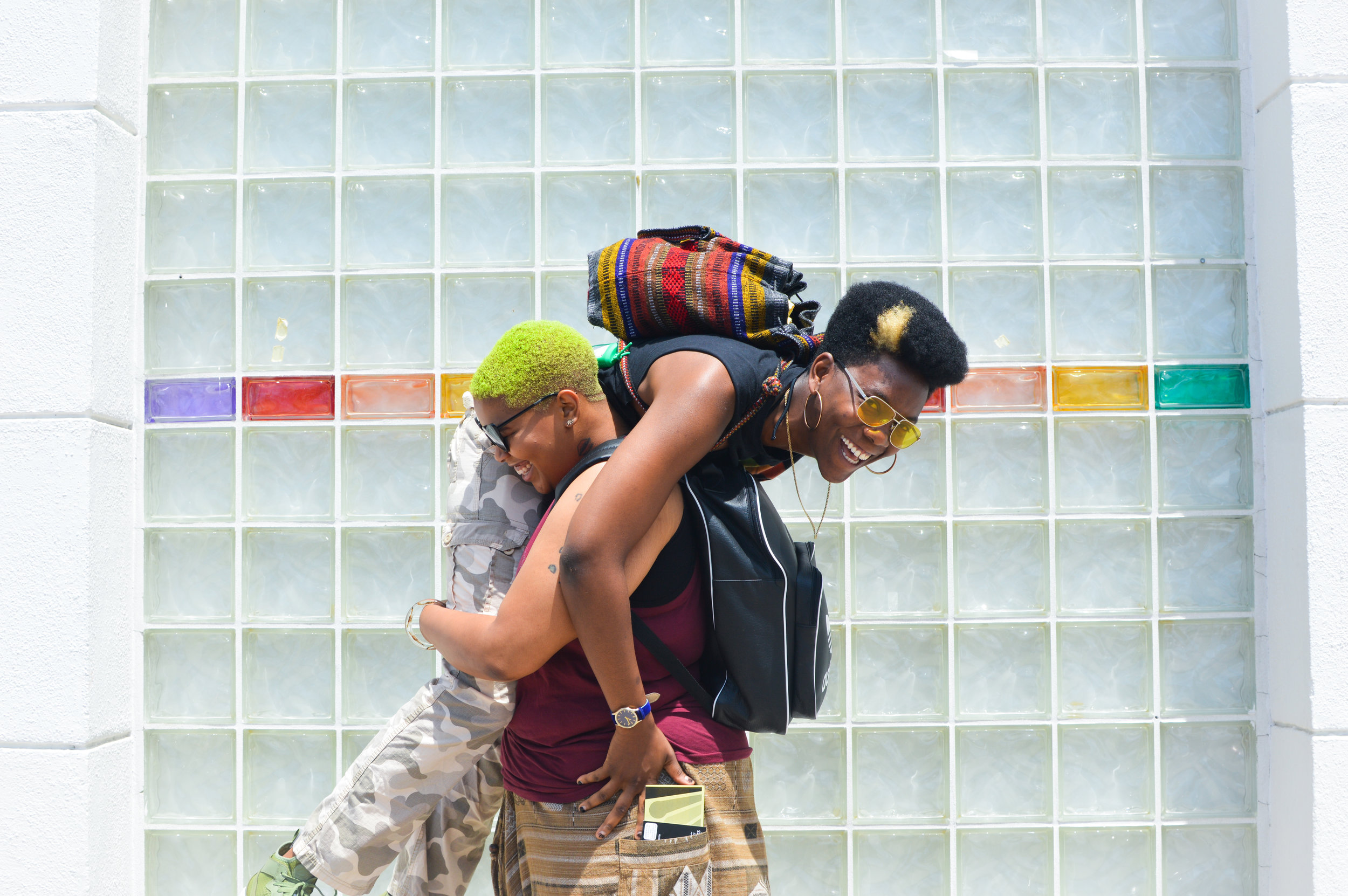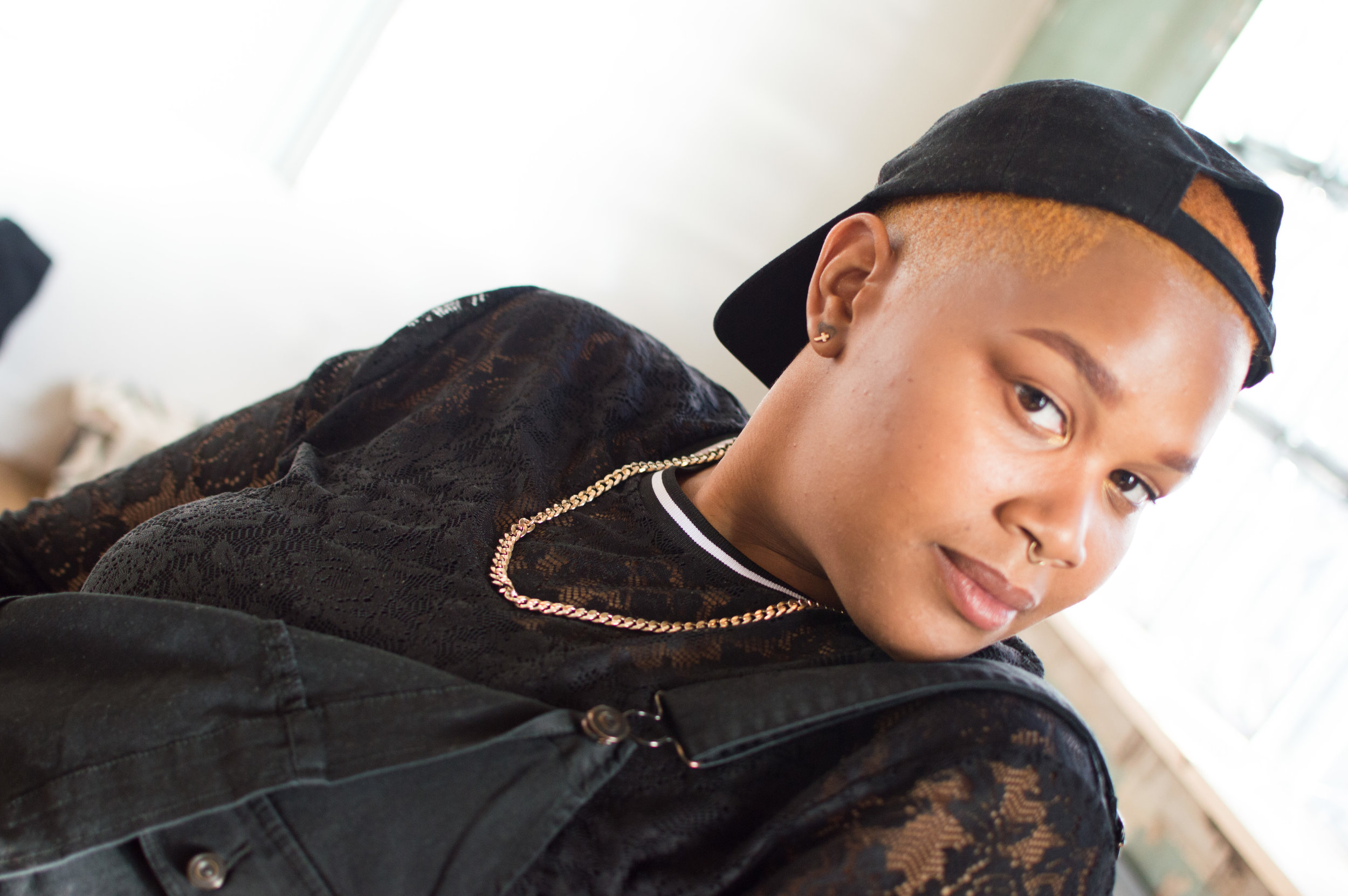COMMUNITY ORGANIZING W/ NIECEE X
Have you ever met someone that made you feel more free by just being? Standing tall at over six feet in proud Blackness and Queerness, Niecee X’s has that presence. I was introduced to Niecee X at a panel hosted by Pabst Blue Ribbon, VICE and Flaunt in Los Angeles — where the topic discussed was the American Dream. This inspiring panel was comprised of community leaders featured in PBR’s 'America Dreaming' Documentary series.
Niecee X, second from left
During the panel Niecee X described her American Dream as being in a country where everyone is able to dream, where everyone has the opportunity to pursue happiness rather than just a select few. I got the chance to sit down with Niecee X after the panel to discuss further what this means in her own community.
TGM: During the panel, you spoke a lot about the importance of community. What is community to you?
N: Community is the ability to communicate, be heard and be seen. Community is being amongst people that hear you and see you and are willing to act on your behalf. If I said that I love you but you were on fire and I had water but all I did was send you good vibrations, do I really love you? Community is about making love actionable.
TGM: What advice would you give to people seeking to create community?
N: I got a piece of advice that really stuck with me which is to speak as though everyone agrees with you. Especially as a woman of color, we are often convinced that maybe our ideas aren’t that relevant or doesn’t fit with everyone else. I think that when we begin to speak about the things that are important to us we realize we are amongst people that have the same ideas and even the same frustrations. It’s as small as reaching out to someone and asking if they want to get a cup of coffee. Those are the building blocks of community. It’s asking ourselves if we are having intentional conversations with the people around us about how they feel and what’s going on in their lives. It’s asking if we have created the kinds of relationships where those conversations can even happen within and if not, what can we do to change that?
TGM: As a community organizer, a lot of people must be coming to you looking for this kind of support & guidance. What are some ways you recharge and make sure you have that to give?
N: It is emotional labor to sit or stand in front of people for an hour and talk about your experiences and rehash trauma. You can’t work all the time and not sleep. You need a moment or place where you can have some solace. It’s been some on the job learning that has inspired me to create places of solace for others and myself. I recharge by spending time with my chosen family, close friends and my mom. Being able to talk to people I know really care about me and understand who I am definitely helps.
TGM: You mentioned on the panel that part of the work you are doing in your community is around gentrification. I lived in Brooklyn for a while and the rate of gentrification I saw was insane, but I also knew I was a part of that in a way because the neighborhoods I was living in were not mine. What advice would you give to someone living in a new neighborhood on how to edify the community when they’re an outsider?
N: There are local organizations everywhere. There are folks everywhere who are doing work in their communities. You wouldn’t come into my house and not ask me how I’m doing or being aware of not putting muddy shoes on my couch. That same consciousness is important to have in the ways you move in the world. The context of being White and going to a place that people of color were forced into continues a certain piece of White supremacy. It brings businesses and spaces that cater to a specific economic class outside of the community. To rectify that you have to genuinely care. You can’t haphazardly come in and be confused. If you don’t genuinely care about the communities you’re moving into then you should stay where you are.
TGM: You shared a poem tonight at the panel & spoke about a poetry night you host called “Queer As Fuck”. Can you speak more about that and some ways you express yourself?
N: My partner and I decided to do a Queer poetry night because the Black lesbian community in Dallas, TX comes together usually through a White woman that hosts all of these events. Her political views are a little wonky but for lack of having other spaces, this is where people ended up. It was really intentional for us to create a place that was not only Queer POC welcoming but that was also politically and socially aligned with the views of that same group of folks. We are hosting a writing workshop prior to our next event because there were so many people that approached us and said they don’t know how to write poetry, but they want to. Audre Lorde talks about how poetry is not a luxury but a way to communicate when there is no other way to communicate. If I could imagine any group of folks that could really benefit from that communication, Queer POC folks are at the top of my list. It’s not only because I am one, but because when you combine being a person of color along with queerness, there are issues you experience that other people just don’t. This space, where people can speak and have others that want to listen and can identify with them, is another part of creating community.
TGM: You’re also creating these types of spaces in Dallas through Black Women’s Defense League and Revolution Cafe & Bookstore. Can you speak more about what needs you saw those stemmed from and how you create community there?
N: I’ve organized since I was a teen trying to get people registered to vote during the Obama campaign. As I became more aware of the political strata that we were really looking at, I got into deeper and more radical forms of politics. At one point I was a part of a group and was dating a guy in the group that was abusive. Experiencing abuse as an organizer within a group, when this person is being propped up as a leader, it was really interesting to me the way those people saw injustice towards me as a woman. When I looked further into it, I realized that machismo and patriarchy impact everything. I had heard stories of women that went to shelters looking for help and were patronized as if they don’t know how to run their own lives. Black Women’s Defense League was created out of a lack of services for women of color dealing with domestic violence. It went on to try to cover a whole scope of issues from police brutality to trauma within our families.
Through that work I learned being an organizer took a lot of money and a lot of time. Revolution Cafe was born to create a sustainability around that same work. We use the money and resources to fund grassroots movements that weren’t non-profits or 501c3, just groups of people coming together to do what needed to be done. This is a space people can meet and gather to do work for their communities.
TGM: Having had all these experiences, if you could go back to talk to yourself when you first started organizing, what advice would you give yourself?
N: I was in Nation of Islam for awhile, then went through some Black Nationalist spaces. My ideas around Black Nationalism is that for lack of having reliable allies in finding justice, people tend to coalesce amongst themselves. I don’t think of it as this dirty word. At the same time it was a space that had a lot of patriarchy and misogyny entrenched in it. Throughout high school I dated both men and women, and that was a piece of myself I had to tuck away because then I wasn’t seen as a militant black woman people could be proud of. Also being a feminist in those spaces wasn’t something I was allowed to do. So the advice I’d give myself is listen to your intuition, listen to yourself and do what you know you must do.
When Freddie Gray had been killed I organized around his being murdered. At this point I was pretty good at organizing and hundreds and hundreds of people gathered around downtown Dallas to protest. Two weeks later Sandra Bland was killed and I took all the same avenues towards promoting and advertising protesting her murder. I did the exact same thing I’d done before and only a handful of people showed up, primarily women. This broke my heart in such a way that I knew I had to do work for women. I had never been more sure of what I needed to do. So I’d tell myself to move in the way that feels right to you. As weird or esoteric as it is to talk about, but that ancestral sense of what we must do & being willing to listen to that.
I told a former mentor that I was gay and his response was, no one is going to listen to you or respect you. You need to keep that to yourself. This is a man that has been in political arenas for years and I think he thought he was doing me a favor by telling me that. When I looked at that & what happened with Sandra Bland I realized that people aren’t here for Black women anyway, so why are these the people I am trying to impress? Why do they deserve that energy from me? From that point on, I put energy towards people that reciprocate my energy and shared the same struggles. That’s where power comes from. That’s why trusting your instincts and intuition is so important, ‘cause it’s not only for you it’s for the next person who needs encouragement on how to do that.
You can support the work Niecee X is doing and Revolution Cafe as they search for a permanent space at on GoFundMe. To find out more about Queer as Fuck and Niecee’s community in Dallas, TX you can follow her on Instagram @_revolution_cafe and on Facebook at Revolution Book Cafe







